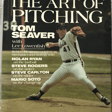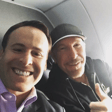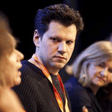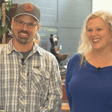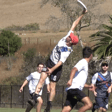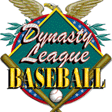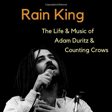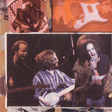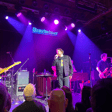Become a Creator today!Start creating today - Share your story with the world!
Start for free
00:00:00
00:00:01

A Conversation with Author Chris Van Dusen
Acclaimed author, Chris Van Dusen, sits down with Graeme to discuss his early years as an illustrator, his literary influences, and his sources of inspiration.
Transcript
Introduction with Graham Brown and Chris Van Dusen
00:00:00
Speaker
Hey everybody and welcome to the Crawling Around My Brain podcast. I'm your host, Graham Brown, and I wanted to add a quick prelude to today's podcast with acclaimed author and illustrator, Chris Van Dusen. What
Chris Van Dusen's Career and Inspirations
00:00:11
Speaker
you will hear in our discussion is about Chris's beginnings as an illustrator and an author, what makes his book so unique and memorable, and also some of our shared experiences in Maine.
00:00:22
Speaker
What you won't hear are the technical difficulties that sidetracked us for a fairly substantial amount of time as we began to record. And I just wanted to thank Chris again for his patience. And as you'll
Overcoming Technical Challenges
00:00:34
Speaker
hear in the podcast, he's extremely personable and he didn't let it bother him one bit. I hope you all enjoy this podcast as much as I enjoyed recording it. He stepped up and took a stance while everyone fell as if frozen in a trap.
00:00:51
Speaker
Randy's eye was on the ball. No room for error now. Three, two, one, and flip the switch. A swoosh, and then kapow! A blinding crash, a booming crash. He knew what he had done. Randy Riley had a hit. His very first home run.
00:01:19
Speaker
And
Celebrity Excitement in Graham's Family
00:01:20
Speaker
welcome to the Crawling Around My Brain podcast. I'm Graham Brown. And today I have the distinct pleasure and honor of speaking with award-winning author and illustrator, Chris Van Dusen. Chris, welcome to the program. Thanks so much, Grant. Thanks for having me on.
00:01:36
Speaker
Absolutely. I just want to say it's a real thrill to have you on today. I was speaking with my wife before we had the chance to connect and we were laughing and saying there are a lot of celebrities that could walk through my front doors and my children would have no interest in whatsoever. But if you came in, they would go absolutely crazy. So you're very popular in my house. Oh, that's nice of you. Thanks so much.
00:02:03
Speaker
Yes, and I know that you can't see me right now, but I'm holding a stack of your books in my hand. I
Discovering Chris's Books
00:02:11
Speaker
don't have the entire collection. I am working on building that out, but I have a lot of them. And we were actually introduced to you by a friend of ours, Sarah. And once we got the first book, which I believe was the Randy Riley story, once we got that one, we just started ordering the rest of them up. So this is a real honor and a pleasure for me to talk to you about this stuff.
00:02:33
Speaker
Oh, thanks so much, Bill. How old are your kids? So I have three children. I have a 10 year old and then I have a three and a half year old and a two year old. And later on, I had a question set to go. But I guess now is as appropriate as ever. What's really cool about your books is that it works for all of them. You know, it's not it's not I mean, obviously, the younger ones can't read the words, but the pictures are so interesting.
Appealing to a Broad Audience
00:03:01
Speaker
and impressive that they kind of get immersed in that. And then my older daughter can read them too, because the stories are not necessarily like childish is how I would describe it, right? So there's some deeper meanings and there's a lot of interesting vocabulary. So it really works across the board. Yeah, yeah. I did try to throw in some challenge words and some, it's definitely a plot. I mean, there are a lot of children's books out now that are just,
00:03:30
Speaker
Kind of like extended jokes. But I kind of follow the classic story arc, you know, where you introduce characters and then there's a dilemma or a problem and it's resolved and it resolves down to a nice ending. So I'm pretty, I'm pretty traditional when I come to storytelling. But yeah, I really appreciate that. Thank you for saying that. Yeah, absolutely. And, you know, that's something that I was talking to my wife about was really about how
00:03:59
Speaker
you know, the stories and some of the children's books that we've purchased, and we've purchased many along the way. In some of those cases, they seem almost like commercials or something where it's like a tension grabbing, but there's not necessarily a lot of depth to it.
00:04:14
Speaker
And I was curious if that, you know, it sounds like it's something that you're, you're cognizant of just really building out a story. But how do you kind of thread that needle so that the story can work for, you know, a younger child and also for maybe an older kid as well, or an adult, really?
Writing Style and Audience Engagement
00:04:30
Speaker
Yeah, there's a term that I just, I just learned.
00:04:36
Speaker
And it's used in movie making, it's called, I'll probably get it wrong. So I think it's something called like a four quarter story. And that means that they appeal to, you know, kids
00:04:52
Speaker
older kids, young kids, older kids, parents, and even grandparents. It's sort of like it covers all bases. It's putting enough in the story to keep everybody's interest involved or engaged, rather. So I'm glad to hear you say that.
00:05:12
Speaker
I certainly don't want to talk down to kids. I learned that right when I first started writing books. A friend of mine said, don't, whatever you do, don't dump it down for kids because they are way smarter than you think they are. And if they think you're dumping it down for them, they will see right through it. And they'll lose interest. They just don't want to be, it's almost insulting to them. You know, if they, if they realize that someone has, you know, written a quote unquote children's book for kids, um,
00:05:41
Speaker
And they realize it's been sort of, you know, it's actually below their level. They just, they will reject it. So I always try to fill challenge words in there. Those are words that kids don't necessarily know, but may have asked their parent or, you know, look up if kids can look words up.
00:06:03
Speaker
You know, and it's just, it sort of, I think it sort of raises the story to a slightly different level rather than, you know, just two characters sort of talking or something just kept super simple simply because the author doesn't know that kids can comprehend things much higher than what they perceive. So yeah, I try to do it that way. And I think that's probably what adds depth to the story.
00:06:33
Speaker
Yeah, I 100% agree and just say, I speak for all the parents when I say thank you very much because we're doing a lot of book reading and it's a thrill to be able to read something that I enjoy at the same time. Not to say that there aren't others that are out there, but certainly when I say to my kids, go pick out a book and it's one of yours, I'm like, okay, awesome, this is gonna be good for me too. And just as an example of the vocabulary,
00:06:59
Speaker
Like in King Hugo's, the King Hugo's story, you have, you know, hottie and squall and, you know, in the big truck, Little Island book, you have transected. I mean, these are big words, but they flow perfectly within the story. And to answer your question, yeah, I think it is true that people still look up words because I know that my kids ask me what they mean. And so the good, you can usually tell you, you make it
00:07:25
Speaker
such a way that either the pictures describing it or you know just a context clues you can figure it out but definitely something that sets you apart as a as an author but i wanted to kind of take it back and i know you know i did do a little research for this so i don't want to make you repeat stories that you've told in the past but i just i did want to you know just take it back to kind of the origin story and
00:07:45
Speaker
What made you decide to write children's books in the first place remember in one interview you talked about how you were starting off as an illustrator and you were designing a swing set instructions so i don't know if you want to pick it up there but just really how did you get interested in involved in it. Yeah
Illustration to Writing: Chris's Journey
00:08:02
Speaker
let's go back to the past so i was i was definitely an illustrator before i became an author.
00:08:09
Speaker
In fact, I didn't write my my first book wasn't published until I was 40 years old. So I was a late start. I mean, a lot of my peers are, you know, they had their first books published when they were in their early 20s. And now they've got hundreds of books, you know, 28 or 29 or whatever. But, but so I started as an illustrator. And at the time, this was probably in the late 1980s, 1990s,
00:08:39
Speaker
I was doing most of the editorial illustrations, so magazines, newspapers, things like that. But the type of illustrations I really liked doing were for kids' magazines. And at the time, there were a lot of kids' magazines. There was just a handful of really high-quality children's magazines. So they hired a lot of illustrators.
00:09:00
Speaker
And so I found myself kind of working with the same batch of illustrators in these different magazines. And then one thing I noticed at the time where some of these illustrators were peeling off and they were writing children's books, which is always an interest of mine, but I never really thought I could pull it off. I never really thought that, I knew the publishing world was really competitive, really hard to get into. And so I just said, well, I'm just going to stick with the illustration.
00:09:30
Speaker
and see where it goes but more and more of my peers were like producing these really great books and I thought wow now here's something a little bit more permanent because one thing about when you're working for a magazine
00:09:41
Speaker
or a newspaper or you're doing an illustration, you're putting your all into the illustration, but it's basically a throwaway. When people get down with magazines, they don't put them in their bookshelves necessarily, they throw them in the recycle bin. And so I remember seeing some of my work at our local dump in the recycle bin and go, oh, hey, I did that. And then you kind of think, oh, hey, I
00:10:11
Speaker
So this sounds a little bit like King Yoo themself, but I kind of wanted something that was going to be a little bit more pernish, for lack of a better term, something that's not so disposable. And when I saw my peers producing some really great stuff, because they were illustrators that were writing and
00:10:34
Speaker
And so the illustrations were great and stories, some of the stories were fantastic too. So I was just working one day on an illustration, this idea popped into my head. I don't know where it came from. I have no idea, but it was an image of a man and his dog in a boat stuck in the top of a tree. And I just sort of thought about that. And that
00:10:57
Speaker
nine years later, it became my first book, which is called Down to the Scene of Mr. And then once that first book is published, it sort of becomes your biggest business card for lack of a better term. I mean, it really gets your foot in the door. And if it does well enough,
00:11:16
Speaker
which luckily Mr. McGee did, I was asked by the publisher to do a second Mr. McGee story, which became my second book. And then from there, things just sort of took over and I've been doing, I still do a little bit of editorial illustration, but not much, maybe like one illustration every couple of years or so, but it's mostly just children's books, which I really love doing.
00:11:41
Speaker
You know, it's really interesting and inspiring to hear you talk about that story. And I have a follow up question because it came it kind of came through to me in a different way.
Legacy of Children's Books
00:11:51
Speaker
But, you know, in terms of this podcast, it's about it's starting off with things that are kind of passions of mine or things that I find really kind of interesting. And I've had some music and I had a board game that stuck with me. But I would agree. I think
00:12:02
Speaker
the books and it's not true for all books, right? There's some books that resonate and children's books. I mean, some of the books that we have in our house are ones that we've kept right out of maybe the hundreds that we had. There was like five or 10 that really stood out. And I think yours belong in that group. But I think that's one of the things I thought was so cool is like you're making this art and that it's going to carry on and leave a legacy. And I think that's really cool and fascinating. And I also think
00:12:31
Speaker
It's interesting to hear you talk about your personal origin story because on your website, chrisvandusen.com, which I would encourage everyone to go check out because not only can you buy the books there, which is really cool, but you have a really interesting frequently asked questions page. And it was interesting
Chris's Online Presence and Advice
00:12:48
Speaker
to me because like half of the questions it seemed like were about what's it like to work in this industry and how do you get started and how do you have an agent and do you need an agent and stuff. And I was like,
00:12:59
Speaker
I thought it was really interesting because people that are motivated to do something, you know, that maybe is a passion but feels like maybe an impossibility, those are questions that they have. And I thought it was really, you know, generous of you to be providing those answers for people. So I was going to ask you,
00:13:19
Speaker
Did you post those questions, those answers, because you just get asked them a lot? Or just because you felt like, hey, this is something that it took me a while to learn. And so I just want to share this information for people.
00:13:31
Speaker
Yeah, it was probably the former because I did get asked a lot. You know, people would send me emails and say, you know, I've written a children book now, now what do I do? How do I get this? I've written a story, how do I get this published? And so I decided to put those a little bit of information on the website. There's not, I mean, I could have put in like five pages of information about getting a book published. But
00:13:58
Speaker
The bottom line is it's just really competitive. And unless you really want to devote your career to it, it's going to be really hard to get a book published. Because to get a book published, you really need an agent. And that's a whole other thing.
00:14:18
Speaker
And an agent doesn't want to take you on unless you're really committed to the craft. You're really committed to doing it. I mean, if you've written a children's book because your grandchildren like this story about these kittens or something or whatever, and you think, well, maybe I'll try to publish it. Your likelihood is pretty slim because
00:14:39
Speaker
you know, if, even if you did get your book published, the publisher, if it was successful, the publisher should say, okay, what's next? What's, what's your next book going to be? And so it's, yeah, it's a tricky, it's a tricky situation. I'm glad you found some of the information on that page useful. It kind of skims it kind of, it's a very,
00:15:02
Speaker
shallow explanation of how the children's book publishing world works, because it's really complicated. Like I said, it's really competitive. And even if I was starting out now instead of 23 years ago, I don't know if I'd be able to make it, because it's just so, I mean, publishers, well, first of all, they pay a lot of money to publish a book. So they're really investing in a story.
00:15:31
Speaker
And they're only going to pick stuff that they think kids are going to like that will sell well. I mean, really bottom line is money, right? If it sells well.
00:15:41
Speaker
And so they're really choosy on what they're going to publish and who they're going to publish. And is this person have a unique voice or a unique art style that's really going to stand out? So it's tricky. It can be done. And their agent's still picking up new talent. But boy, you really have to have something unique.
00:16:07
Speaker
and a unique voice to say it and to really grab someone's attention.
00:16:14
Speaker
Yeah, I totally agree. And I think when I first read it, I was like, man, Chris has given away the secret sauce. Now everyone's going to be a children's book author and illustrator. And then I was like, wait a second. Not everyone is going to manipulate gouache in such a way that the pictures are going to be so vivid and so detailed. And I think
00:16:38
Speaker
just when I was reading about your process. And there's actually some really cool videos that you've done, one of which with LL Bean that I wanted to circle back to. But what was amazing to me is when I first saw your books, I was like, oh, it's crazy how far digital creation has come. This is really impressive. And then to get a look in your studio and see you actually painting these pictures and realizing
00:17:06
Speaker
the amount of expertise and artistry and just, you know, again, the time that you're committing to each of these images. I was
Artistic Techniques and Influences
00:17:16
Speaker
taken to another, I was totally blown away. And I thought to myself, man, he should sell these as prints, you know, like surely people would be interested. And then it turns out on a website, you can get some of those, which is iconic.
00:17:29
Speaker
images of the robot, you know, hitting the home run at the, you know, sorry, spoiler alert for anyone who hasn't read that one, for the robot hitting it out of the park. And so it led me to understand it's like,
00:17:43
Speaker
You can have the basic recipe ingredients for chocolate chip cookies or something like that. But to really to make it work and have it be something that appeals to a lot of people, it has to be something special. And certainly your your art is is really is just a superior visually to most children's books. So I guess that's a compliment. And then also, you know, you mentioned that your
00:18:08
Speaker
maybe inspired by like Dr. Seuss and Robert McCloskey. And so is that, what was it about them that you were trying to maybe emulate or kind of that helped you sharpen your own skill?
00:18:26
Speaker
Sure. Well, first of all, a lot of kids think I work in computers. I believe it. Because the colors are so bright and the surfaces are fairly flat. Yeah. But I don't. It's all gouache. It's all gouache painting. And for the people listening that don't know, gouache is a paint that comes in the type of paint I
00:18:49
Speaker
type of gouache I buy rather is comes a little tubes and you mix it with water and you can use it a bunch of different ways you can use it with a lot of water and it sort of becomes like more like a watercolor where you can put washes and blend colors or you can use it with fairly little water and it becomes sort of
00:19:08
Speaker
and you can cover up mistakes, and you can work toward the foreground by covering up things in the background. So that's why I use it. And I also use it because it reproduces really well. And that's not true of all media, because I used to work, when I was doing, I was working for a greeting card company for a while, and I used these dyes, these watercolor dyes, and you'd get these really pretty colors on these illustrations. But then when it came to printing,
00:19:37
Speaker
your white oranges would turn kind of blue, your aquas would turn sort of a weird blue, and you'd just go, oh, what's happening? So not all media will reproduce really well, but gouache is pretty true. I mean, what you see in the book is almost exactly what I painted. It doesn't vary much at all. So Dr. Susan McCloskey were two of my main
00:20:02
Speaker
influences. Because those are the books I bought when I was growing up. And my mother would take us to the library like every week and I'd always run to the children's section and I'd grab, you know, as many Dr. Seuss books I could carry. We didn't have them at home, but I always got another library. And those are big books to go through. I was a little kid with like five or ten Dr. Seuss books under my arm. But I think I like Seuss mostly for his wordplay.
00:20:28
Speaker
And his rhyme, obviously. Most of my books are written rhyme. There's only one book I've written that does not rhyme. It's called Hattie and Hudson. But it actually started out as a rhyming book.
00:20:40
Speaker
I realized I was trying to tell a fairly serious story or a story with more of a message in kind of a whimsical, humorous way. It just didn't mix. We have that one, by the way, and it's been read so many times that the cover has fallen off and we had to tape it back on. I am an owner of that one. I love to hear that.
00:21:09
Speaker
But, but so when I was first working on down to see with Mr. McGee, I, I would read all the Dr. Seuss books and I think I have them all. And I would just read them over and over again. The only problem with that is when it comes time to writing your own story, you find yourself sort of picking up lines from Dr. Seuss. In fact, I had this line, I was writing this story and I showed it to my wife and I had this rhyming couplet and I thought it was so clever. And I said, and she got to that part of the story and she goes,
00:21:39
Speaker
Wait, that's Dr. Seuss's line. As it is, she goes, yeah. And it turns out it was directly from the Grinch, almost directly from the Grinch.
00:21:49
Speaker
And I went back and looked at it and said, oh my gosh, I gotta be careful. So you have to kind of find your own voice. But McCloskey, I really liked his illustrations more than I liked his words, although I liked some of his stories were just fantastic. But his illustrations were unparalleled. They were just, his draftsmanship is just,
00:22:15
Speaker
out of this world. His gesture drawings, his make way for ducklings, those, the way he drew those ducks with just that simple conti gray on and, oh, they're just beautiful and just stunning. So, so I probably, he was probably influenced by art and the amount of detail in his illustrations. I mean, he just had, he just packed his illustrations full of detail, which are really fun.
00:22:39
Speaker
And then, and probably the words more, maybe the story more for Dr. Seuss and the art more for McCloskey. So yeah, they were definitely big, big influences to my work. It's interesting that those names appeared and it's funny, maybe go back and be like, what did, what did Robert McCloskey
00:22:58
Speaker
Right. And then I started realizing that even without knowing it, those are just books that we had gravitated to at the library or that we owned. Right. We didn't even it wasn't a conscious decision unlike your books where we went and we're seeking them out. You know, for his, it was more just like.
00:23:13
Speaker
Oh yeah, this one's really enjoyable and kind of stands apart. It's a little different. And then I realized, oh yes, that's the same author that did blueberries as a blueberries for sale. And then, yeah, right. And then the ducklings book that you're talking about in make way for the ducklings and.
00:23:28
Speaker
It takes place in Boston, I think. But I was like, well, it's interesting that that just naturally we found ourselves leaning toward that material. But the other thing I thought was notable there is so I have a personal connection to Maine that essentially my family has been going to Maine for generations. My grandfather was born in Vinyl Haven, which I know is the location for one of your stories. And I spent summers in Bremen.
00:23:54
Speaker
And my family still has a place in West Bath, a place called Sabino. So, you know, there's a connection for me to Maine. And obviously I know you live in Maine and a lot of your stories take place. So is there something about Maine that you think works well for these stories or is it more kind of just write about what you know? I don't know if you have any thoughts on that.
00:24:16
Speaker
Yeah, I think it might be part of right what you know, I mean, the landscape I live in mid coast Maine, a small town right over the coast. And it's, it's kind of tourist town. You know, the population swells in the summer, but the natural beauty is just incredible here. I mean, we have
00:24:37
Speaker
mountains that lead right down to the ocean. We have a beautiful little harbor with an island with a lighthouse in it. It's just so picturesque here. And we have a big lake. The lake that I based at the lake in Hattie and Hudson is in town. So I'm definitely inspired by the landscape. And it's funny, your grandfather, you said, grew up on vinyl haven? Yeah, he grew
Inspirations and Personal Connections
00:25:06
Speaker
up on vinyl haven.
00:25:10
Speaker
popular book was based on a shipwreck that happened right off of Final Haven back in 1836. And my latest book, which is called Big Truck Little Island, is also a story based on something that happened on Final Haven. So Final Haven is giving me a lot of material. Yeah, I took a screenshot. I think it's kind of cool how you provide that piece of
00:25:35
Speaker
kind of the origin story for the book, you know, in the ones where it's appropriate, you know, you talked about those two specifically, I remember sending screenshots to my father and saying, look at this is incredible. It was like a reason for me to reach out to him to connect about it, because there is a lot of history there. And then I know you said in terms of inspiration for the if I, you know, built a school or a car, like that series, that was an idea that you had had as a as a as a kid.
00:26:03
Speaker
Is that right? Was that kind of your inspiration for those? Yeah, and those were inspired by Dr. Seuss, quite close too. When I was sort of working my first book and reading all those Dr. Seuss books, like I said before, one thing I noticed is he sort of had this formula that he wrote
00:26:28
Speaker
a formula, but I call it a formula, where he starts a story by introducing a character. Usually it's a boy and he's thinking about something and he imagines something and then it sort of builds. So each page almost sort of becomes a story itself. I'll give you an example. So EFI Notebooks were really inspired by two specific books that Dr. Sush wrote, what was called?
00:26:55
Speaker
like the zoo story, starts this boys in this zoo and he said, you know, this is okay. It's almost exactly what I wrote. But this is okay. But you know, if I ran the zoo, this is what I would do. And he talks about each animal that he would bring and capture and bring into this zoo. And they get sort of more and more elaborate as they go. And then the very last page you realize
00:27:17
Speaker
if he's back in the same setting that he started out in. And it's all been his imagination. And he did that with the circus. And he did it so successfully. So I thought I'd really like to write in that style, that formula, sort of where the kid imagined something and you don't know if it's real or not. It sort of looks real and throughout the story and it gets kind of crazier and crazier and crazier until you realize at the end that it's been just his imagination. But I didn't want to copy so this again,
00:27:45
Speaker
And when you start reading all these Dr. Seuss books, you start writing in his style and you go, oh boy, I really gotta change that around. So that's why I haven't done a circus or a zoo, but I have done a car, a house at the school. Yeah, no, I thought it was a brilliant idea because, I mean, again, it just brought me back. I was like, oh man, I used to take paper out and diagram the stuff and have it all and say, oh, this is what I would do. And a couple of your features, I think there's a pool and a couple of them. And I'm like, yeah, absolutely,
00:28:15
Speaker
I grew up in Connecticut, so it wasn't a lot of opportunity to get out and go swimming for most of the year. So that to me was always very idealistic and would be included in a lot of my designs. So I was happy to see that in yours as well. So I know I said I was going to circle back to a couple other main specific things. So let me do that. But before I do that, I wanted to ask you, I don't know if it's all of the books, but in a few of them, you have kind of this like on the inside cover art, there's like this blueprint type look.
00:28:45
Speaker
Right. And was that your idea? Like was that as a flourish to kind of show it's either what the character is doing or maybe it's Randy Riley building the robots or whatever, but there's, I think that's a really interesting touch. Was that your idea to do that? Yeah.
00:29:03
Speaker
By the way, that's called the end papers. They're in the front of the book and there's the back of the book. And most of the times end papers are just like patterns or just a simple color. Some of my books are just a colored paper and there's no real detail. Hattie and Hudson, I did sort of an illustration of a lake scene that just kind of opens up the book.
00:29:29
Speaker
book is going to take place. But for the If I Built books, I thought it'd be really fun to show Jack's imagination. Jack is the boy in the book, his imagination right on the first end paper. So when you open up, let's say, If I Built a Car, the first book in that series,
00:29:46
Speaker
You see all these little drawings sort of scattered around in the papers of a kid drawing all these crazy cars with fins and wings and multiple headlights and he's written down little comments and things like that. But I did ask special permission from my publisher if I could
00:30:05
Speaker
not have the same endpapers on the front as I could in the back because you know I didn't want to I didn't want to show the car that Jack describes throughout the book on the front endpapers because you'd see
00:30:22
Speaker
But the closing men papers show the car or the house or the school that Jack has described throughout the book. So it's kind of different. But it was just kind of a fun way to add one more little element that kids could have fun exploring. And a lot of kids have really
00:30:41
Speaker
Really enjoyed those and papers, especially if I don't books. Yeah, I think it's it's just a really nice touch to your point It's just usually a part I skip over in a lot of books but in yours we always spend a few extra minutes on each of those so Very cool. So okay. I have to circle back to close off the main conversation. There are two other things that really popped out to me both were equally impressive and both were almost mind-blowing the first is a
00:31:07
Speaker
that you, I believe this is true, that you designed the lobster for like a special license plate for the state of Maine. Is that correct?
00:31:16
Speaker
Yeah, I did. One of our specialty plates in Maine is the lobster license plate. There used to be one that was designed way back. It was kind of hard to see because it was just a red outline of a lobster, but it was tucked behind the numbers and letters on the plate. So you couldn't really see it. It just kind of looked like this red smudge, hidden by most of those numbers.
00:31:42
Speaker
This was several years ago. I was contacted by an ad agency that I had done some illustrations for, a local ad agency. And the woman who ran the agency, her husband, was the head of the Maine Lossman's Association. At the time, the catch was down.
00:32:01
Speaker
And the lobstermen were really struggling. They weren't getting the money for the catch and it was just, it was a really tough time for them. And so they proposed this new lobster license plate as a way to fundraise for the Lobster's Association.
00:32:17
Speaker
And when you buy a plate, I think you have to pay an extra 20 bucks for the license plate, and that money goes to the law firm's association just to help the fishermen. So we redesigned this license plate, and I did the illustration for it, and now I see it driving around in Maine.
00:32:37
Speaker
I bring that around, I'm going to sample a license plate that I bring around to schools and it always kind of blows kids' minds when I pull that out of the portfolio and say, I also illustrated this because they say, oh, my dad's got that on his truck, so. Oh yeah. As someone who's spent
00:32:52
Speaker
hours on the main turnpike. I mean my father was very committed to going to Maine so you know if not every weekend every other weekend in season we would drive from Connecticut up to Maine. I think it was 265 miles if I remember correctly. So there's a lot of time in the car pre-phoned for people that are listening. There was nothing else to do besides harass my brother but we did do a lot of license plate spotting and so I am sure that I've spent countless hours staring at that. So
00:33:20
Speaker
That was really interesting to me. And then the second, and also the lobster piece, by the way, you know, my whole life, I just assumed lobster was like chicken, right? Because we ate it all the time because we were there. And then it was only once I moved out of the Northeast that I realized it was much more of a delicacy than I recall. So the second thing I think people associate with Maine is L.L. Bean and those catalogs and the store and fruit board. And then I believe you, what I read was that you have done 14 L.L. Bean catalog covers. Is that correct?
00:33:49
Speaker
Yeah, that's right. Yeah. Wow. So that's amazing. And I would, I was just going to ask also if you got a discount on any of the main, on any of the elevent clothing at this point. I don't think I did. My son now works for L.P. So we sometimes buy things with his discount.
00:34:12
Speaker
But yeah, no, I did that. That's back when I was doing freelance illustration. This was print books. And I worked with some great art directors. I mean, they're very specific of what they wanted, though. You know, there wasn't a lot of leeway. You know, I couldn't stray too far from the original concept because, you know, you're representing such a nice
00:34:39
Speaker
to what they have in mind. But yeah, I think I did like 14 covers. Some were better than others. Well, it's probably for context for people. It's like, it's a catalog for Ella Bean, but it's not like a catalog where you get it in the mail, you flip through, you throw it away. I distinctly recall visiting
00:34:58
Speaker
people's homes in Maine and it would just be almost like a magazine that was left on the table and then even saved. I mean we had a stack of them and you know we weren't like a family of hoarders or anything but it was just that they're not a typical you know like I said throw away disposable things. I thought that was just a really cool kind of side note but yeah okay I've got a couple more for you here. I wanted to ask
00:35:24
Speaker
you have so much detail in your images. And two things came to mind. One was when you're painting a picture like the living room scene in Randy Riley, where the parents are sitting on these couches and Randy's running by. And when I started looking around, I was wondering, is that something where your
00:35:50
Speaker
Looking at pictures beforehand to get inspiration. Is that just coming straight off the top of your head from a memory? I mean, it's so Vivid that I was just kind of curious to know I mean it probably might be a blend of both but it is that is that do you have like Pages up around you for inspiration as you're doing that stuff Well that that book, you know, I've always had kind of
00:36:18
Speaker
I was born in the 60s, you know, and so I sort of grew up with things that were aqua and orange and streamlined and just really bright sort of pastel colors. And so
Design Influences and Easter Eggs
00:36:32
Speaker
I really love illustrating those things. And also, I mean, when it comes right down to it, parents really like that too. I mean, parents, you know, go, okay,
00:36:42
Speaker
Yeah, when my second book came out, which is called a camping spirit, Mr. McGee features Mr. McGee, you know, teardrop trailer, a camper that he takes up to the mountains. And, and when I remember when I was signing for that book, I had I had I specifically it was an aloe bean, it was actually, they had me down to aloe bean to have a book signing there. And I was right in the lobby, and people came in. And this guy came in with his wife, and he came over. And he said, Oh, I gotta buy this book.
00:37:11
Speaker
And I said, do we sign for your kids? He said, No, I don't have kids. But we used to have a camper. But to get back to your original question, I do have some books of mid century modern design. That's, that's the style I really love. And I decided when I when I started Randy rally, I was gonna sort of base it on these, these sci fi
00:37:41
Speaker
you know, what giant robots invaded Earth, you know, it was kind of like had that feel to it. Yeah, I really wanted to set it in sort of that 50s 60s era. And, and so I do have some books on, you know, mid century modern houses. And I did look at some of those and the way they have sort of those sunken living rooms
00:38:03
Speaker
brick planters that sort of surrounded the living area with cut leaf philodendrons and, you know, all these little high fives and these big boxing TVs and stuff. So, yeah, I do do some reference when it comes to things like that. But a lot of it's out of my head, too. Yeah, it's amazing. Like the couches, the lamps, the plants. I mean, even, you know, small details like the cars that are parked. One, one specifically is in a garage and one's under like a
00:38:33
Speaker
a park lit or something like that. But what's amazing about it is I live in Long Beach, California now and walking my kids around the block. There's a guy who has two kind of classic cars. I don't know specifically what they are, but immediately when they saw them, they're just the tail end. They were like, that's a Randy Riley car. That's a Randy Riley car. And so now everywhere we go, if they see an older car, it's a Randy Riley car. So it's, it's really effective. And mid-century modern is so unvogue again too. So it's almost like,
00:39:02
Speaker
without knowing it, you might be able to give design ideas to some people too. Yeah, and you talk about detail, like in that illustration you just mentioned where Randy Riley is coming down the stairs to warn his parents about this giant fireball hurling toward their town. You can look in the coffee table, and there's a magazine, and it's actually a magazine called Look, which is no longer a publication, but it was kind of
00:39:33
Speaker
magazine was there. And I found a copy of Look magazine that I think had General MacArthur on the cover or something like that. If you look really closely, I copied that cover and painted it on the coffee table. I spent so much time and I go, why are you doing this? Because nobody's going to notice that. I guess it's just from my own enjoyment. I was going to ask you about that. Well, first of all, I'd say keep doing it because it is awesome.
00:40:01
Speaker
You know, after you've read something, you know, 50 times to your kids, too, it's fun to start to look for kind of more things in the image to like the cereal box in the same story when he's at the has like alien thing on it, you know, and there's just a lot of specifics like that. But I was going to ask you if you intentionally drop what you call like an Easter egg within your stories, because I was looking like
00:40:23
Speaker
even some of the numbers of the houses or you'll have like initials. And I was like, I wonder if he's if he adds things and they're like a shout out to your wife or your family or your kids where you'd be like, hey, you know, I put your initials on the license plate or something like that. Do you intentionally do that kind of thing? Oh, yeah, definitely. So so one of the things you always find in my books that I
00:40:48
Speaker
wrote, not the books I illustrate for other authors, but in the books that I've written and illustrated, I always hide Mr. McGee in the picture somewhere. Mr. McGee was my first character. And I thought I was just doing it sort of for my own enjoyment and or amusement. And so he's always in there
00:41:12
Speaker
but you can always find this for making in the book somewhere. But when my latest book came out, which again, was called Big Truck Little Island, he was so small, I put him in so small, because he didn't really fit that book, but I said, I can't leave him out. I put him in the background, very, very tiny. And people, I started, right after that book came out, I started receiving
00:41:38
Speaker
believe you left Mr. McGee. I didn't even think it was a thing. Oh, that's funny. And I got these really, I got these really certain some, some people are pretty angry. I can't believe it. You know, you've broken the street. We can't find Mr. McGee in this book. Well, it got so bad that even my agent who lives in California, he has two little kids. And when you get the book, they looked through and I couldn't find Mr. McGee. And so he told, he told his kids that Mr. McGee had COVID. And that's fine.
00:42:11
Speaker
He's really small. He's about the size of a grain of rice, but he's up there so Yeah, I was I usually put my kids initials my kids well my kids are grown men by now But I still put their names or initials in there Somewhere so you'll see some letters in there that they're kind of you know Yeah
00:42:36
Speaker
And license plates, yeah, that's a good place to hide some things, too. And in Big Chuck Little Island, the license plate on the truck that gets stuck on the road is my dog's name and her birthday. Oh, wow. That's great. Well, I mean, if you're going to spend up to two weeks illustrating something, you've got to have a little something in there for yourself, I would imagine, on top of everything.
00:43:06
Speaker
That's so cool. Well, some have surmised that you're Mr. McGee, right? And I know you kind of, you've said that that's not, that was not the intent, but is that right? Some people have said, oh, you know, this is Chris within the stories. Is that, is that, is there any truth to that? Yeah. And kids, kids in town used to come, you know, every time. And then I'd be walking my dog downtown and someone say, Hey, Mr. McGee.
00:43:30
Speaker
People ask me if I have a dog named Dee a lot, which is Mr. McGee's dog, but I don't. My dog's name is Opal. But the funny thing about Mr. McGee is my wife thinks he looks just like my oldest brother. And I guess he kind of does, although he really wasn't based on it. It was just sort of a made-up character. But it was funny, my oldest brother,
00:43:57
Speaker
He worked in an office, sort of a big call center type office in Belfast, Maine. He's since retired, but people started noticing they looked like Mr. McGee. I knew people, they knew the books. And so they started calling him Mr. McGee at work.
00:44:19
Speaker
He said one day he was in his office and this woman that worked, a young woman that worked in the office brought her kid into his office to meet the real Mr. McGee. And I had to say to him, oh I'm so sorry, you had to go through that. He said no, it was fun. He said we had fun with it. He's really just a made up character.
00:44:45
Speaker
Oh, that's so funny. I love it. I think any way to twist the screws and have fun with your siblings is a good thing. So I'm all for that. Well, I really appreciate it. I feel like I've gotten to ask pretty much every question that I wanted to ask, although I could go on and on. I've been biting my tongue, as you've been saying, the different book names, because as I mentioned, I've had them all. And not only have I read them,
00:45:08
Speaker
on a regular basis, but obviously read some through again before we had our call. And for those who are listening to podcasts that haven't read the books, I would just, I can't recommend them enough. So I was going to ask, in addition to going to your local library or local bookstore, is the best place for people to get your books through your website?
00:45:29
Speaker
You can get them through the website. I think it's a link to your local independent bookstore. I think that's the way it works. I haven't checked it out lately. But yeah, that's probably the best way. I encourage people to support their independent bookstores. They work hard. They're up against a lot of competition. So I try to support the Indies anytime I can.
00:45:57
Speaker
But my books are nationwide. I mean, they're all with fairly big publishers, Penguin, Random House, Candlewick, Chronicle. They pretty much have nationwide distribution. So if you can't find them at your local bookstore, ask. I'm sure they could order them for you, too. Yeah, no, I think that's so cool. I went through and clicked through on your website to one of the books. I didn't realize it was a local bookstore, but I did realize that it was
00:46:23
Speaker
it was probably something that was routing me away from, you know, just one of the major sellers. So I thought that was super cool. And, okay, I also would be remiss if I didn't ask what's maybe next. I know it takes
Future Projects and Collaborations
00:46:36
Speaker
a long time for these to come together. And I know that big truck, Little Island, did that come out in 2022? So fairly recently, right, for that one. So anything in the works? Yeah, that was my latest book.
00:46:49
Speaker
I do have a book coming out in December, but it's a book I illustrated for Kate DiCamillo.
00:46:58
Speaker
Kate DiCamillo was the author of the Mercy Watson books, which I illustrated. Mercy Watson's the name of a pig character. And the stories are great. I mean, we did six books in the first original series. Then she wrote a spin-off series called Tales from Deku Drive. And the last book in that series will be coming out in early December, I believe.
00:47:21
Speaker
It's it's since it's the last book in that series That that series has all been black and white illustrations, but this last book all the full page Illustrations are full color and it's about twice as long. It's it's a really it's a pretty big chapter book so that will be coming out in December right now and
00:47:43
Speaker
I can tell you a little bit about the book I'm working on, but not too much. It's another if I don't book, but that's about all I can say without getting into it.
00:47:57
Speaker
It's going to be longer than the other books. It's 40 pages instead of 32. And Jack is thinking even bigger this time. And I just had to push my deadline back once again, because I'm realizing that there's so much detail. These illustrations are taking me so long that I'm going to need the extra time. So that won't be out for a few years, but I promise it will be worth the wait. So that's what we're going to write now.
00:48:24
Speaker
Well, that sounds awesome. And, you know, I have to check out the Mercy books. I've heard great things as well. So I haven't had a chance to read those myself, but I want to check those out. And also I wanted to just thank you because it's a godsend to have. We have so many friends that have kids, right? And now it's a go-to. It's like Chris Van Dusen books and the kids love them. And it's like a hundred percent approval rating and we're like the favorite people. So.
00:48:53
Speaker
That was, uh, that was, like I said, passed on to us from one of our friends and now we're doing the same thing. And so it sounds like that, that book may be out around the holidays. So there you go. That's a good one for people to get. And then as I mentioned earlier, but I would be, uh, I think it's worth re-mentioning is that you do sell the prints first for some of these iconic images. Like for instance, one that we revisit all the time is from a circus ship. We have the 15 animals.
00:49:19
Speaker
And I've read that book 300 times and I still have fun trying to find the animals within that image. But images like that, that people that are listening to this have read your books will know those right away.
00:49:29
Speaker
That's a really cool idea to get a print of one of those for a kid's bedroom or something like that. I think it's super interesting. Sure. Thanks for mentioning that. Yeah, very cool. Awesome. Well, we will stay tuned to what you're working on. I really cannot thank you enough for coming on and spending this time with me. Obviously, you're a very busy and accomplished person, and it means a lot that you would take the time, and I hope everyone has enjoyed our conversation.
00:49:58
Speaker
Thank you very much, Chris. Enjoy the rest of your day, and good luck in everything moving forward. Thank you so much, Graham. It's been a great pleasure talking to you. And I wanted to hear more about your story, but I guess I don't have to wait for another time. But yeah, thank you so much for having me on. Great questions. And please give my best to your kids. I will do. Absolutely. Thanks, Chris. OK.
